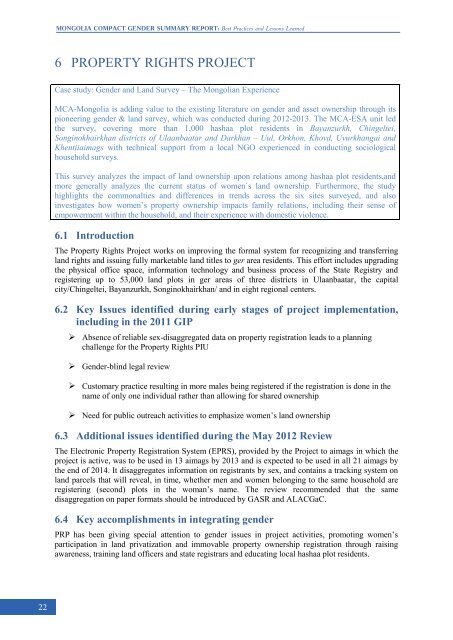Ulaanbaatar 2013
Ulaanbaatar 2013
Ulaanbaatar 2013
Create successful ePaper yourself
Turn your PDF publications into a flip-book with our unique Google optimized e-Paper software.
Mongolia Compact Gender Summary Report: Best Practices And Lessons Learned6 PROPERTY RIGHTS PROJECTCase study: Gender and Land Survey – The Mongolian ExperienceMCA-Mongolia is adding value to the existing literature on gender and asset ownership through itspioneering gender & land survey, which was conducted during 2012-<strong>2013</strong>. The MCA-ESA unit ledthe survey, covering more than 1,000 hashaa plot residents in Bayanzurkh, Chingeltei,Songinokhairkhan districts of <strong>Ulaanbaatar</strong> and Darkhan – Uul, Orkhon, Khovd, Uvurkhangai andKhentiiaimags with technical support from a local NGO experienced in conducting sociologicalhousehold surveys.This survey analyzes the impact of land ownership upon relations among hashaa plot residents,andmore generally analyzes the current status of women`s land ownership. Furthermore, the studyhighlights the commonalties and differences in trends across the six sites surveyed, and alsoinvestigates how women‟s property ownership impacts family relations, including their sense ofempowerment within the household, and their experience with domestic violence.6.1 IntroductionThe Property Rights Project works on improving the formal system for recognizing and transferringland rights and issuing fully marketable land titles to ger area residents. This effort includes upgradingthe physical office space, information technology and business process of the State Registry andregistering up to 53,000 land plots in ger areas of three districts in <strong>Ulaanbaatar</strong>, the capitalcity/Chingeltei, Bayanzurkh, Songinokhairkhan/ and in eight regional centers.6.2 Key Issues identified during early stages of project implementation,including in the 2011 GIP‣ Absence of reliable sex-disaggregated data on property registration leads to a planningchallenge for the Property Rights PIU‣ Gender-blind legal review‣ Customary practice resulting in more males being registered if the registration is done in thename of only one individual rather than allowing for shared ownership‣ Need for public outreach activities to emphasize women‟s land ownership6.3 Additional issues identified during the May 2012 ReviewThe Electronic Property Registration System (EPRS), provided by the Project to aimags in which theproject is active, was to be used in 13 aimags by <strong>2013</strong> and is expected to be used in all 21 aimags bythe end of 2014. It disaggregates information on registrants by sex, and contains a tracking system onland parcels that will reveal, in time, whether men and women belonging to the same household areregistering (second) plots in the woman‟s name. The review recommended that the samedisaggregation on paper formats should be introduced by GASR and ALACGaC.6.4 Key accomplishments in integrating genderPRP has been giving special attention to gender issues in project activities, promoting women‟sparticipation in land privatization and immovable property ownership registration through raisingawareness, training land officers and state registrars and educating local hashaa plot residents.22Page 22 of 80


